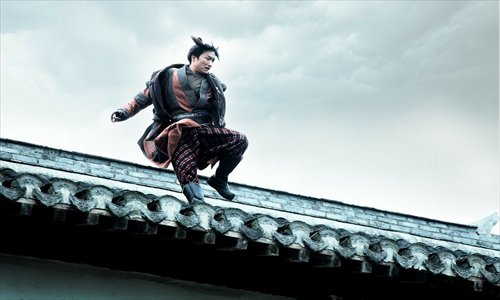Not so awesome foursome

Who has the ability to read minds and gets around in an electric wheelchair powered by incomparable intellect? No, it isn't Professor Xavier from X-Men or even physicist Stephen Hawking. Introducing Emotionless, China's newest young heroine with telepathic powers played by Crystal Liu in Hong Kong director Gordon Chan latest kung fu epic The Four.
The film is based on wuxia literature master Wen Rui'an's novel of the same name, which tells the story of a crime-fighting quartet. The 125-minute film's courageous attempt to revive the ailing genre of kung fu films in China has earned it a successful albeit controversial reputation at the box office since its release on July 9.
The Four has so far raked in 150 million yuan ($23.5 million), leapfrogging domestic blockbuster Painted Skin: The Resurrection for top spot last week. But not all viewers of the film have given it the thumbs up, hinting at growing fatigue among Chinese audiences for kung fu productions.
Figures from douban.com's movie database show only 8 percent of more than 22,300 viewers gave it four or more out of a possible five stars, while over 55 percent gave it two stars or less. Statistics from database mtime.com aren't much more flattering, with the median rating from nearly 5,000 viewers just 5.3 out of 10.
Most critics lambasted heroes of The Four, which also stars Anthony Wong, Deng Chao, Ronald Cheng and Collin Chou, for being too similar to those in Marvel Comics' X-Men. While Emotionless is portrayed as being much stronger than Professor X, she shares Magneto's skills of being able to move items using telekinetic powers.
Fellow crime fighter, Iron Fist, has the ability to design and make machines powered by electricity generated from his hands - seemingly a fusion between Storm from X-Men and Tony Stark, the engineer alter ego of Iron Man.
While Chan seems strongly influenced by comic book superheroes, he's also enlisted other fantasy villains including werewolves and zombies. One attribute Chan appears to have overlooked, however, is the fact Chinese audiences are paying to see a fresh, exciting movie, not a poor imitation with Chinese characteristics of X-Men (2000), Van Helsing (2004) or Resident Evil (2002) garnished with kung fu.
Chan appears to have selectively chosen some of the decades-old traits of Chinese kung fu cinema in an attempt to navigate a new, uncharted direction. While a daring move, it's not one that pays off. Quite simply put, there's no room an electric wheelchair in a movie supposedly set in the Ming Dynasty (1368-1644).
Chan fails to explain the principles of his bold, new world, which is where he loses the confidence of his audience. Hollywood has already cemented its own parameters that define superheroes, including the values they stand for.
Western audiences are familiar with them, just as Chinese fans are familiar with traditional kung fu films.
The Four aims to find middle ground between the two, but only succeeds in falling flat on a cinematic no man's land.
Betraying the classic virtues of Chinese kung fu cinema is the arguably greatest threat facing the genre. Perhaps the most infamous example of this can be found in director Tsui Hark's box office flop The Legend of Zu (2001), which drew criticism from kung fu purists disillusioned at computer-generated scenes of flying, sword-wielding martial artists.
A more recent example is Alan Mak's The Lost Bladesman (2011), which told the well-known story of Guan Yu, the famous general who lived during in Three Kingdoms period (220-280).
In Chinese culture, Guan is revered for his unfailing honesty and loyalty to warlord Liu Bei. However, Mak's film sees Guan fall in love with Liu's wife, an affair that didn't go down well with many Chinese moviegoers.